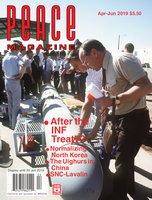
Peace Magazine Apr-Jun 2019, page 5. Some rights reserved.
Your eight-page article “Hello Canada,” authored by the president of the Ploughshares Fund, puts a welcome spotlight on the dangerous nuclear weapons nonsense of today.
The dangers posed by Iran, North Korea, Pakistan and Russia are well underlined. No mention, however, of the threat from the United States? No mention, sadly, of Britain, which possesses the most non-independent nuclear system of them all. Yes, we make our warheads but we have to borrow the missiles on which to put them from the United States. Gross national vanity and the illusion of security.
Several relevant issues were not mentioned in these eight pages. Nuclear war by accident or miscalculation? Robert McNamara, former US Secretary of Defense, said at the end of his life that we were saved not by good judgment but by “good luck.” Such luck does not last forever. Non-state terrorists, of whom the world is not short, are not deterred by threats of retaliation. Against whom do we retaliate?
Also missing is any reference to the Treaty on the Non-Proliferation of Nuclear Weapons, which came into force in 1968. It obliges the signatories (art. V1) “to pursue negotiations in good faith on effective measures relating to cessation of the nuclear arms race at an early date and to nuclear disarmament…”
Getting rid of nuclear weapons everywhere ought to be the aim. We have done it with chemical weapons and bacteriological ones. There is nothing sacred about nuclear ones.
The Preamble of the United Nations Charter says its primary purpose is about getting rid of the scourge of war.
That is the major task which should unite us all.
Bruce Kent
Vice President, Campaign for Nuclear Disarmament, London, UK
In the Jan-Mar 2019 issue of Peace Magazine, the editor solicited comments on how to cure the spiteful attitudes prevalent in populist movements.
Many say that populism is characterized by economic pessimism, anger at elites, mistrust of mainstream media and science. Some rightly suggest that part of the explanation lies with high levels of inequality, tepid economic growth.
The trend to inequality started in the 1980s and continues today. Canada’s share of national income received by the top 1% of the population rose from 7% in 1985 to 11.3% in 2016.
The fundamental research on inequality was presented in the work of Wilkinson and Pickett in 2009 which showed the correlation between many societal ills and inequality in their studies of many developed nations.
The correlation is with inequality per se rather than low income. This trend occurs throughout the liberal economies, giving rise to the irrational response known as populism, due to a general feeling on the part of many people that they are getting a bad deal. They are willing to follow these demagogues out of desperation.
It would be more correct to identify these economies as neo-liberal—that is, having an inherent belief that the market knows best and economic growth solves everything. To arrest these negative trends, it is necessary to lower inequality with a more progressive taxation system that redistributes income and wealth. This will counter the natural tendency of capitalist economies to transfer wealth to the one per cent from the rest of the population. This would be better for everyone but don’t count on those who benefit to fix this broken economic system.
I believe that economic liberalism is leading to a general feeling of powerlessness among the lower middle classes. Is there any way to restore welfare liberalism? I’d promote ecosocialism but I don’t know how to make it happen.
Don Kerr
Collingwood, ON